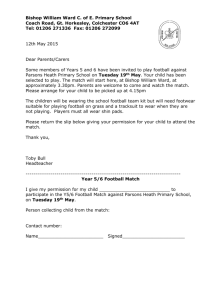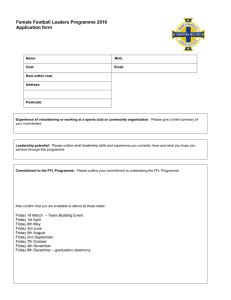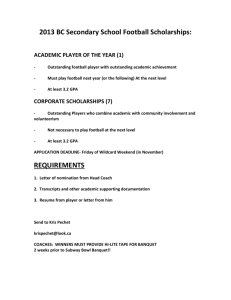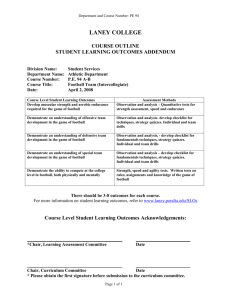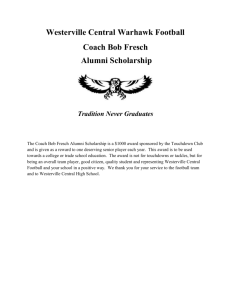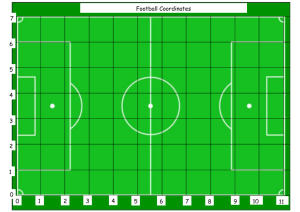GESC 2070
advertisement
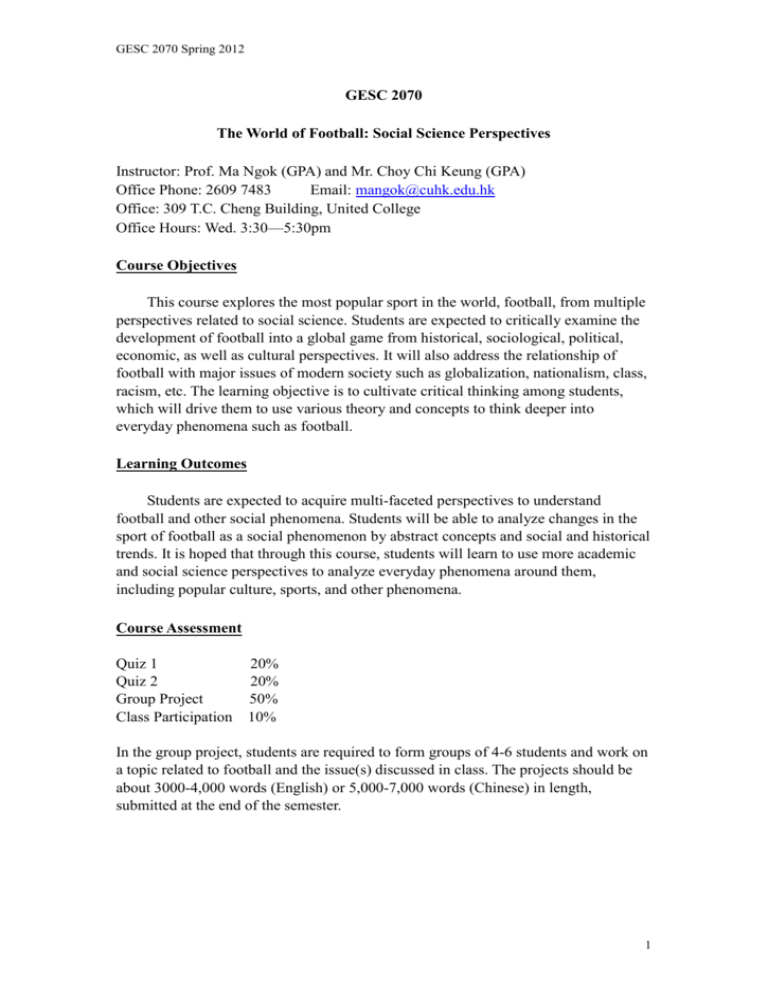
GESC 2070 Spring 2012 GESC 2070 The World of Football: Social Science Perspectives Instructor: Prof. Ma Ngok (GPA) and Mr. Choy Chi Keung (GPA) Office Phone: 2609 7483 Email: mangok@cuhk.edu.hk Office: 309 T.C. Cheng Building, United College Office Hours: Wed. 3:30—5:30pm Course Objectives This course explores the most popular sport in the world, football, from multiple perspectives related to social science. Students are expected to critically examine the development of football into a global game from historical, sociological, political, economic, as well as cultural perspectives. It will also address the relationship of football with major issues of modern society such as globalization, nationalism, class, racism, etc. The learning objective is to cultivate critical thinking among students, which will drive them to use various theory and concepts to think deeper into everyday phenomena such as football. Learning Outcomes Students are expected to acquire multi-faceted perspectives to understand football and other social phenomena. Students will be able to analyze changes in the sport of football as a social phenomenon by abstract concepts and social and historical trends. It is hoped that through this course, students will learn to use more academic and social science perspectives to analyze everyday phenomena around them, including popular culture, sports, and other phenomena. Course Assessment Quiz 1 Quiz 2 Group Project Class Participation 20% 20% 50% 10% In the group project, students are required to form groups of 4-6 students and work on a topic related to football and the issue(s) discussed in class. The projects should be about 3000-4,000 words (English) or 5,000-7,000 words (Chinese) in length, submitted at the end of the semester. 1 GESC 2070 Spring 2012 University Policy and Regulations on Honesty in Academic Work Attention is drawn to University policy and regulations on honesty in academic work, and to the disciplinary guidelines and procedures applicable to breaches of such policy and regulations. Details may be found at http://www.cuhk.edu.hk/policy/academichonesty/ . With each assignment, students will be required to submit a signed declaration that they are aware of these policies, regulations, guidelines and procedures. For group projects, all students of the same group should be asked to sign on the declaration. For assignments in the form of a computer-generated document that is principally text-based and submitted via VeriGuide, https://www.cuhk.edu.hk/veriguide/ the statement, in the form of a receipt, will be issued by the system upon students' uploading of the soft copy of the assignment. Assignments without the receipt will not be graded by teachers. Only the final version of the assignment should be submitted via VeriGuide. Key Texts David Goldblatt. The Ball is Round: A Global History of Football. London: Penguin Books. 2007. James Walvin, The People’s Game: The History of Football Revisited. Edinburgh and London: Course Contents (A) The Evolution of Modern Football: A Sociological Interpretation (Jan. 20) Football activities before the advent of industrialism: folk football and others The rise of modern football in the 19th century: sociological origins and analysis Football as an urban male sport: education, social control and the peculiarities of British football The spread of modern football as a process of globalization The evolution of football rules and tactics Reading: James Walvin, The People’s Game: The History of Football Revisited, Chapters 1 & 2. Lunar New Year Holiday (Jan. 27) 2 GESC 2070 Spring 2012 (B) Evolution of British football & The Story of Manchester United (Feb. 3 & 10) The Founding of the Football League/ From Newton Heath to the Interwar Years The Chapman Revolution (Arsenal) 1950s: Postwar reconstruction and Football under Industrialism/ Busby Babes Out of Isolation and Self-Adulation+ Going to Europe/ The Munich Disaster and the Man United Mystique 1960s: Commercialization, Affluent society, TV football and the Golden age of British football / The New Stardom of Best, Law and Charlton From 1970s to mid-1980s: low-tide of English football, economic adversity, hooliganism and football violence/ Relegation, Liverpool Dominance, the music chairs of managers The Alex Ferguson era, November 1986Gazza’s tears, the Coming of the Premiership, Taylor Report and TV Revolution/ The building of the United Dynasty The Commercialization and changing class nature of football/ ‘Prawn sandwiches’ and the United Inc. Going to Europe and the World EPL as global merchandise / The Biggest Club in the World Readings: Anthony King. The End of the Terraces: The Transformation of English Football in the 1990s. London and New York: Leicester University Press, pp.37-69. John Williams, “The Fall of Liverpool FC and the English Football ‘Revolution,’ in John Williams, Stephen Hopkins and Cathy Long eds., Passing Rhythms: Liverpool FC and the Transformation of Football pp.147-171. Kristen Rosaaen and John Amis, “From the Busby Babes to the Theatre of Dreams: Image, Reputation and the rise of Manchester United,” in David Andrews ed., Manchester United: A Thematic Study (London and New York: Routledge, 2004), pp.43-61. (C) Football and Fandom (Feb. 17) From “one of the lads” to global megastars Football Hooliganism and its explanations: masculinity and others Heysel, Hillsborough, the Taylor Report and the development of British football Readings: Eduardo Archetti and Amilcar Romero, “Death and Violence in Argentinian Football,” in Richard Giulianotti, Norman Bonney and Mike Hepworth eds., Football, Violence and Social Identity (New YorK; Routlege, 1994), pp.37-72. 3 GESC 2070 Spring 2012 Anthony King, The End of the Terraces, Chapter 12. Carlo Podaliri and Carlo Balestri, “The Ultras, Racism and Football Culture in Italy,” in Adam Brown ed., Fanatics! Power, Identity and Fandom in Football (London and New York: Routledge, 1998), pp.88-100. Quiz No. 1 (Feb. 24) (D) Football and Nationalism and other Identities: The Case of Barca (Feb. 24, March 2 & 9) Football and nationalism in developing countries The case of Barca, or Barca vs Real, El Classico Football and Racism Football and politics: how political leaders made use of football The story of local derbies: city rivalries and other cultural identities Readings: Jimmy Burns, Barca: A People’s Passion. London: Bloomsbury, 2000, Chapter 4. Vic Duke and Liz Crolley, Football, Nationality and the State (New York: Longman, 1996), Chapter 1 & 3. Simon Kuper, Football against the Enemy (London: Orion, 1996), pp.205-219 “Celtic and Rangers, or Rangers and Celtic” Les Back, Tim Crabbe and John Solomos, The Changing Face of Football: Racism, Identity and Multiculture in the English Game (Oxford and New York: Berg, 2001), Chapter 6. (E) Globalization and Football (March 16 & 23) The spread of British football as an example of globalization How Globalization Changed the Economy of Football Globalization and the Changing Economy of Football The Rise of Global TV and how it changed the game American Exceptionalism The Dark Side The global migration of players and ‘football slaves’ Global football gambling and game-fixing The World System Theory and the impact of global economic inequality on football 4 GESC 2070 Spring 2012 International Governance Development of FIFA and the changing face of the global game World Cup: global commercial spectacle and commodities fair Readings: Ian Bent, Richard McIlroy, Kevin Mousley and Peter Walsh, Football Confidential (London: BBC Worldwide, 2000), pp.143-155.”Soccer Slaves” Andrew Jennings, Foul! The Secret World of FIFA: Bribes, Vote Rigging and Ticket Scandals (London: HarperSport, 2006), pp.19-31; pp.74-94. Andrei Markovits and Steven Hellermen, Offside: Soccer and American Exceptionalism (Princeton: Princeton University Press, 2001), pp.28-51. (F) 香港足球的興衰 (March 30 & April 13) 「亞洲足球王國」--中華民國與五、六十年代的香港足球 從業餘到職業──七、八十年代的黃金時期 足球滄桑與香港意識:與中國隊的恩怨情仇 香港足球的沒落與改革前景 Readings: 楊志華, 《香港足球史話》(香港:文明,2009), pp.39-50; 53-65; 91-102. 馬嶽﹐「足球滄桑與香港意識」,《教授足球》(香港:CUP, 2005), 頁 34-41. April 6 (Easter Holiday) Quiz No. 2 (April 13) (G) Football and Socialism (April 20) Development pattern of Sports in Socialist Countries The Golden Team of Hungary in 1950s and Socialist Football Football in Post-socialism Readings: Simon Kuper, Football against the Enemy (London: Orion, 2000), pp.16-26 “The Football Dissident” Jonathan Wilson, Behind the Curtain: Travels in Eastern European Football (London: Orion, 2006), pp.68-97. 5 GESC 2070 Spring 2012 Major References Brown, Adam. Ed. 1998. Fanatics! Power, Identity and Fandom in Football. London and New York: Routledge. Burns, Jimmy. Barca: A People’s Passion. London: Bloomsbury, 2000. Conn, David. The Football Business: The Modern Football Classic. Edinburgh and London: Mainstream Publishing. 1997. Giulianotti, Richard. Football: A Sociology of the Global Game (Cambridge: Polity Press, 1999). Hill, Declan. The Fix: Soccer and Organized Crime. Toronto: McClelland and Stewart, 2008. Jennings, Andrew. 2006. Foul! The Secret World of FIFA: Bribes, Vote Rigging and Ticket Scandals. London: HarperSport. King, Anthony. The End of the Terraces: The Transformation of English Footabll in the 1990s. London and New York: Leicester University Press. Kuper, Simon. Football Against the Enemy. London: Orion, 1996. Markovits, Andrej and Steven Hellermen. Offside: Soccer and American Exceptionalism (Princeton: Princeton University Press, 2001). Vialli Gianluca and Gabrielle Marcotti, The Italian Job: A Journey to the Heart of two great footballing cultures (Reading: Bantam, 2006), White, Jim. Manchester United: The Biography (London: Sphere, 2009). Williams, John, Stephen Hopkins and Cathy Long, Passing Rhythms: Liverpool FC and the Transformation of Football Wilson, Jonathan. Inverting the Pyramid: A History of Football Tactics. London: Orion. 2008. Winner, David.. Brilliant Orange: The Neurotic Genius of Dutch Football. London: Bloomsbury, 2000. 莫逸風、黃海榮著,《香港足球誌》(香港:上書局,2008)。 馬嶽,《教授足球:以治學態度睇波》(香港:CUP, 2005)。 6

